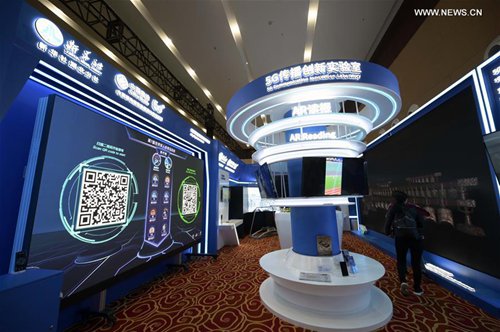
Photo taken on October 17 shows a view of the 5G communication innovation laboratory organized by Xinhua News Agency at the Main Media Center of the 7th International Military Sports Council Military World Games in Wuhan, Central China's Hubei Province. Photo:Xinhua
By already launching research into sixth-generation (6G) technology, China can be expected to extend the country's healthy lead over the US in global 5G into a future world that is increasingly reliant on technology, Chinese experts said on Thursday.
The announcement by the Ministry of Science and Technology (MOST) Wednesday that China was kicking off research into 6G came a few days after the rollout of 5G commercial services in China, the world's largest internet market.
Chinese net users responded to the ministry announcement by expressing marvel at the nation's capability and resolve to set its eyes on next-generation technology.
The ministry, together with several government departments, the Chinese Academy of Sciences and the National Natural Science Foundation of China, held a meeting in Beijing on Sunday to start research on 6G technology, according to a statement posted on its website.
Two teams were announced: one consisting of relevant government bodies and the other made up of 37 experts from universities, scientific research institutes and companies.
The announcement invited a global spotlight on China's technological achievements, although 6G is already on the agenda of major economies including the US and a slew of technology firms including Chinese tech giant Huawei.
Ready for a head start"6G will certainly be a major upgrade in terms of functions and performances including mobile broadband, latency, reliability, intelligence, power consumption and coverage, although 6G is still a concept so far without specific definition and standards," said Tang Xiongyan, chief scientist of the network technology research institute at China Unicom, one of the country's three telecom carriers.
Technologies and frameworks should be adopted to boost research and exploration, Tang told the Global Times on Thursday.
The system of networks carried by electromagnetic waves is nearing its technical limits, leaving the industry to contemplate what format will enable the next generation of mobile network technology.
Xiang Ligang, director-general of the Beijing-based Information Consumption Alliance, predicted that researchers may explore the potential of terahertz waves or integrate space, sea and ground functions into an intelligent network.
China's 6G drive, albeit not targeting the US, will inevitably add a new layer of anxiety for a country already haunted by China's rising technological prowess, Chinese industry insiders said.
Europe, the US, Japan and South Korea are probably all about to kick off 6G research, Tang noted.
"When one generation of telecommunication technology is put into commercial use, it is time to carry out research on technologies and standards for the next generation," he said, "This is routine."
In a fresh move in late October, Sony, NTT and Intel announced they were forming a 6G partnership.
South Korea's LG Electronics announced as early as January that it was embarking on a research and development plan for 6G telecommunications, and in June Samsung Electronics and SK Telecom decided to work together to develop 6G, according to South Korean media reports.
European countries have also started 6G research, with the University of Oulu in Finland establishing a 6G center early this year and publishing what it claimed was the world's first 6G white paper in September, outlining the key drivers, research requirements and challenges.
Global cooperation
Like 5G, 6G research will hinge on open innovation and international cooperation, Tang believed.
But Chinese market watchers say the US fancies itself a pioneer in global protectionism, meaning any such global push would not be so easy and would most likely have to be spearheaded by China.
Tang predicted the US would reinforce its technological advantage in microelectronics and software, and hope to change the traditional rules of the telecom industry and gain a new edge through subversive technology, ecosystem and business innovation.
The US will surely be alert to Chinese 6G, said Xiang, the consumption alliance director-general.
"The Trump administration is likely to impose more severe sanctions on Chinese tech companies, including Huawei and ZTE, and meanwhile, ban more technology communication or transfer with Chinese companies in an attempt to contain China's 6G technology development," Xiang said.
However, US sanctions and technology blocks will not deter China and will help Chinese technology develop more rapidly, he said, citing China's 5G technology as a precursor.
Chinese analysts all agreed that China was likely to overtake the US in 6G development.
They pointed out the US approach is driven by companies and so cannot attract the best manpower and equipment from all sectors.
Meanwhile technology push is based on the comprehensive research of companies, research institutions and other related departments under government guidance "which is surely more competitive," Xiang said.
As 6G blurs international borders, the US technological approach of splendid isolation will soon lag behind, experts said.
China and the EU with their more open attitudes toward markets and technology will have broader cooperation opportunities, Fu Liang, a Beijing-based telecom industry expert, told the Global Times.
Chinese companies such as Huawei have been cooperating with the EU to deepen 5G development, with broader market access for both sides, he noted.
Zhou Zheng contributed to this story




